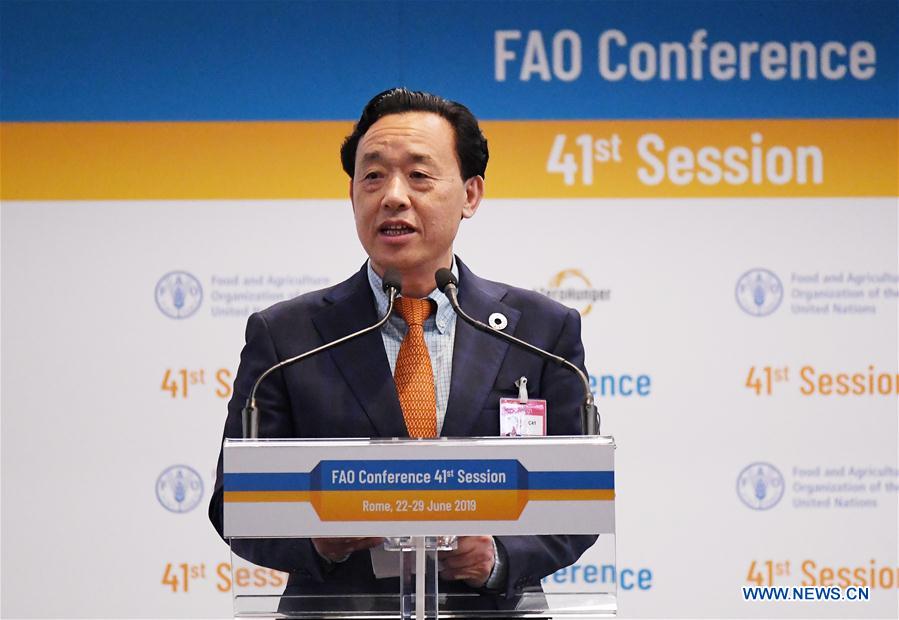China's agriculture vice minister elected new head of UN food agency FAO
Chinese vice minister of Agriculture and Rural Affairs Qu Dongyu was elected as new head of the UN Food and Agriculture Organization (FAO) here on Sunday.
Chinese vice minister of Agriculture and Rural Affairs Qu Dongyu was elected as new head of the UN Food and Agriculture Organization (FAO) here on Sunday.

He is the first Chinese official to be chosen as the head of the FAO, in the over 70-year-long history of the UN food agency.
Single-round voting
His election took place during the ongoing 41 session of the FAO Conference, which has gathered representatives from all of the agency's 194 member states at the headquarters in the Italian capital.
Qu received 108 votes out of 191 totally cast, obtaining the majority in one single round of voting. He won over other two candidates, namely French agronomist Catherine Geslain-Laneelle, a former executive director of the European Food Safety Authority, and Georgia's ex-minister of Agriculture Davit Kirvalidze.
Two of the original five candidates -- one from India and one from Cameron -- had pulled out from the run in the days before the vote.
Qu, 56-year-old, pledged to work at the best of his efforts "for the people and the farmers" in his four-year mandate.
"As FAO's new Director-General, I will be committed to the original inspirations, mandate, and mission of the organization," Qu told the assembly immediately after being elected.
"(I will) Take my responsibility at the supervision of conferences... in a rule-based approach, and I will uphold the principles of fairness, openness, justice, and transparency, remaining impartial and neutral."
He added that he was very grateful to his motherland. "Without (China's) forty years of successful reforms and opened-up policy, I would not have been who I am," he said.
The new DG will start serving his term on Aug. 1, replacing Brazilian Jose Graziano Da Silva, who has led the agency for two consecutive terms since he was elected in 2011.
Qu's mandate will last until July 31, 2023.
Food security
In congratulating him for the victory, outgoing chief Graziano da Silva wished his successor "to lead the organization on the construction of a zero-hunger world and on the promotion of sustainable food systems healthy for all".
"We hope and believe that under the leadership of Mr. Qu, the FAO can make new and bigger achievement. China will fully cooperate with the FAO in all aspects for world food security and the development of agriculture and rural areas," Chinese Agriculture and Rural Affairs Minister Han Changfu told Xinhua on the sidelines of the conference.
Indeed, in guiding the agency towards the Sustainable Development Goals (SDGs) related to agriculture, food security, and nutrition -- as set by the UN Agenda 2030 -- the new FAO Director-General would have to increasingly deal with the results of climate change and geopolitical instability at global level.
Both factors heavily affect the resilience to natural disasters and to food and resource shortages of vulnerable people -- and especially of rural communities -- in developing countries, concretely feeding hunger around the world.
The election of the new Director-General took place during the second day of the biennial FAO Conference, which is the highest governing body of the organization.
The ongoing 41st session of the Conference opened on June 22, and would last through June 29.
The UN Food and Agriculture Organization was founded in 1945, and it comprises of 194 member states, plus one member organization (the European Union) and two associate members (the Faroe Islands and Tokelau).
China has joined the organization since its inception, and has long been a major contributor to the agency's activities and especially to FAO's South-South Cooperation Program.
According to the agency, FAO specific activities in China focus on five priorities, including strengthening capacity for quality and safety management of agricultural products, boosting capacity to respond to diseases, climate change and natural disasters, and promoting sustainable agro-ecological development.

